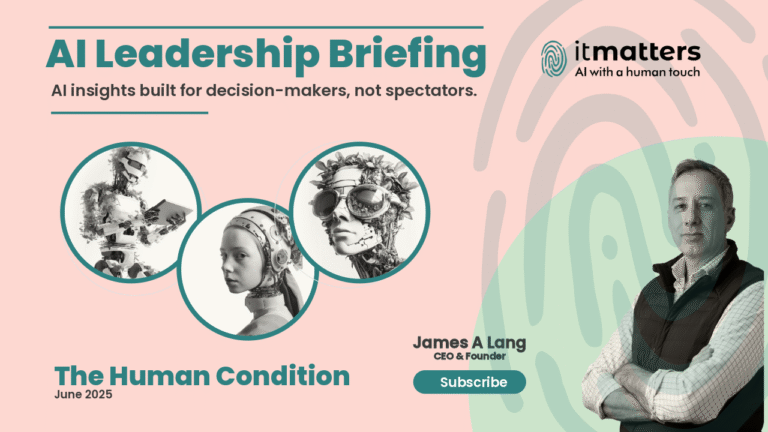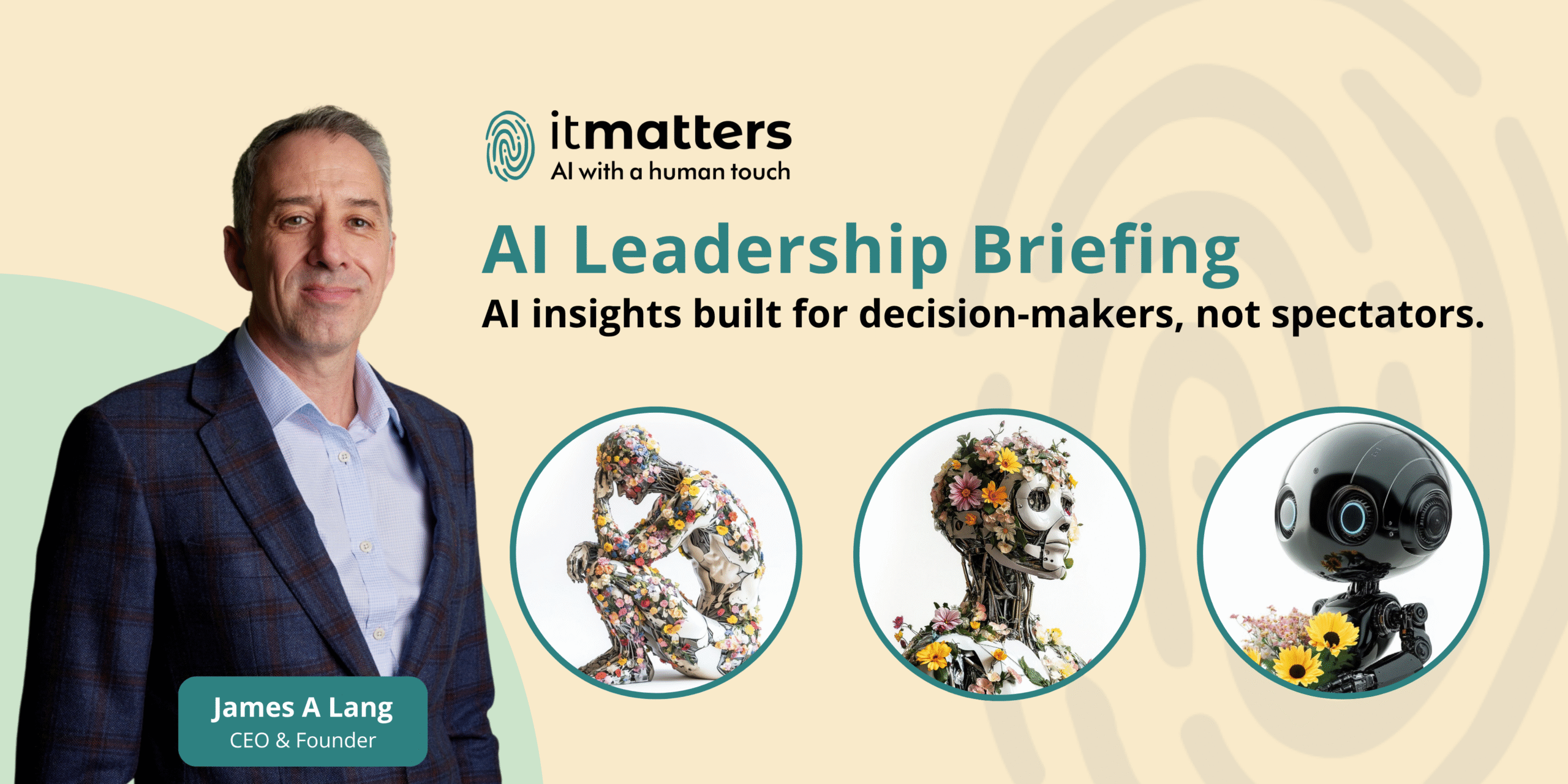The itmatters AI Leadership Briefing
AI insights built for decision-makers – not spectators.
Series: The Future of Trust – Week 3: Synthetic Influence
Edition Date: Thursday 19 June 2025
As the AI World Congress London brings together leaders from business, government, and smart cities, one question rises to the top:
Can human-centered AI scale without losing the humanity it promises to serve?
From AI in customer experience to generative tools in public services, we are now designing systems that don’t just work faster—but feel personal. Yet with every layer of automation, we must decide: Are we enhancing the AI-powered decision making process, or replacing human connection?
Reflective Human Insight
Empathy can’t be programmed—but it can be simulated.
The question is: should it be?
As AI strategy increasingly revolves around trust and emotional UX, we must ensure simulation doesn’t replace sincerity.
Today’s Tactical Signals
1. AI World Congress London Opens for Business
The UK’s flagship AI event gathers innovators, policymakers, and industry leaders to debate the intersection of AI with IoT, machine learning, robotics, and more.
Why it matters: The conference sets the agenda for responsible AI adoption, spotlighting the need for transparency, ethics, and human-centred design in an era of synthetic influence.
(AI World Congress, 2025)
2. NHS Pilots AI Mental Health Chatbots
Following successful local rollouts, the NHS is expanding trials of AI-powered mental health chatbots and apps, offering immediate, personalised support to those with anxiety and depression.
Why it matters: AI can bridge gaps in mental healthcare access, but must be designed with empathy and user trust at its core.
(BBC Health, 2025)
3. Microsoft Launches AI Collaboration Tools for Enterprises
Microsoft’s latest Copilot features—including multi-agent orchestration and low-code model tuning—are now available, empowering teams to work smarter with AI oversight.
Why it matters: Collaboration tools that blend AI and human input can boost productivity while preserving the human element in decision-making.
(Microsoft, 2025)
4. Google Expands AI Support for Small Businesses
Google is rolling out advanced AI features in Workspace, giving small businesses access to AI-driven communication, document creation, and research tools.
Why it matters: Democratising AI tools helps smaller organisations compete, but raises questions about digital literacy and ethical use.
(TechCrunch, 2025)
5. UK Government’s AI Planning Tool Accelerates Housing Development
The government’s “Extract” AI tool, powered by Google DeepMind, is set to digitise planning documents and speed up the approval of new homes.
Why it matters: AI can drive public sector efficiency, but must be balanced with transparency and accountability to maintain public trust.
(The Guardian, 2025)
6. IBM Launches AI Ethics Training for Public Sector
IBM is expanding its AI ethics training programmes for public sector workers, ensuring that those deploying AI understand its risks and responsibilities.
Why it matters: Upskilling in AI ethics is essential for maintaining trust as public services become increasingly automated.
(Computing, 2025)
Field Note from the Future
It is 2032. A customer service AI resolves complaints with flawless politeness, but users report feeling unheard.
The company reinvests in hybrid human-AI teams to restore trust.
Why it matters for leaders:
Synthetic influence may streamline operations—but it cannot replace emotional authenticity.
Leaders deploying AI in the workplace or customer-facing systems must consider the human cost of digital efficiency. If empathy is outsourced to algorithms without oversight, trust becomes performative.
As we scale AI strategy in high-touch sectors like healthcare, finance, and education, organisations must ensure that AI-powered decision making is guided by ethical frameworks and real human connection.
Summary (Leadership Action)
Balancing AI efficiency with human connection is the leadership challenge of our time.
- Balance AI with human oversight: Ensure technology enhances, not replaces, empathy and judgment
- Invest in hybrid human-AI service models: Combine digital speed with emotional intelligence
- Monitor employee and customer trust: Regularly evaluate satisfaction and perceived authenticity
- Promote AI literacy: Equip teams with skills to critically and ethically deploy AI tools
Trust built on speed is fleeting. Trust built on empathy endures.
Historical Leadership Quote
“No one cares how much you know, until they know how much you care.”
— Theodore Roosevelt
Orders of the Day
Subscribe to the newsletter to stay ahead of the AI curve.
itmatters brings you the clarity, context, and credibility needed to lead in a shifting world.
Tomorrow’s Preview
What’s next for trust in the age of synthetic influence?



